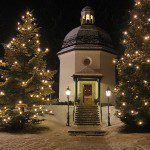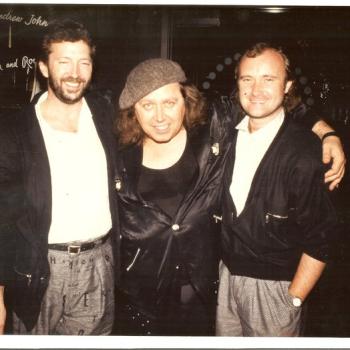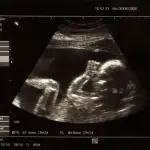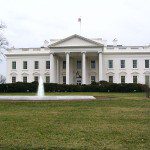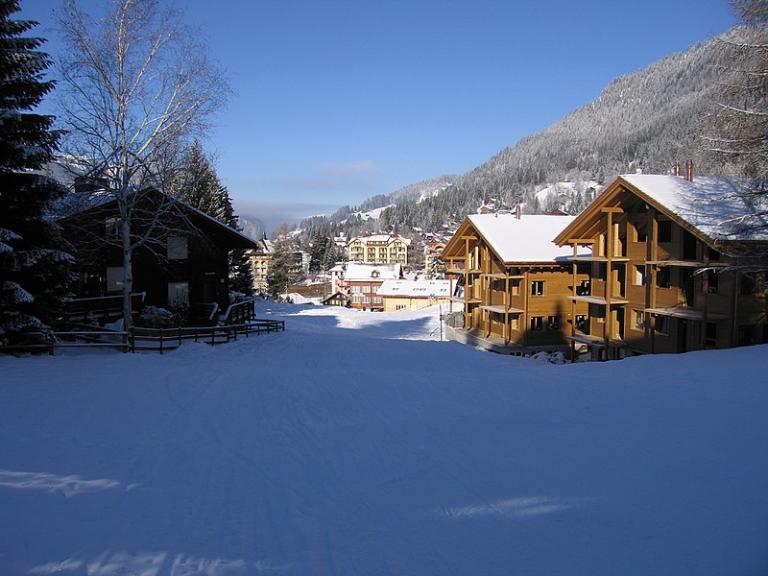
Although I grew up in southern California and have spent considerable time over the years in Israel or Palestine (to say nothing of Egypt), my “Christmas sensibility” is strongly Alpine. We’ll soon, I hope, be having our traditional seasonal meals of Raclette and of Bratwurst, of Wienerschnitzel and Spätzle, of Rolladen (or Fleischvögel) and Rotkohl, and Kartoffelsalat, and, of course, of Käsefondue.
Still feeling under the weather and unambitious and, more importantly, thinking that there might be some interest in these, I share a couple of columns that I first published during Christmas seasons the better part of a decade ago. Here’s the first of them:
The Book of Mormon is something worth noting at Christmas time: It’s a second witness for Jesus Christ. It begins, on its title page, by declaring that it comes forth “to the convincing of the Jew and Gentile that Jesus is the Christ, the Eternal God, manifesting himself unto all nations.” The magnificent chiasm of Alma 36 is literally centered on Christ.
The most important event it records is the appearance of the resurrected Christ in America, an event that’s impossible unless Christ is divine and truly resurrected. It concludes with an invitation to “come unto Christ, and be perfected in him” (Moroni 10:32), and it testifies that “there is no other way nor means whereby man can be saved, only through the atoning blood of Jesus Christ” (Helaman 5:9).
Moreover, it’s a second witness to the essential truth of the New Testament gospels.
Book of Mormon authors knew in advance that Jesus would come to earth and take a physical body (and they knew the approximate time of his coming). Several saw him before his mortal advent. They knew his name-title, “Jesus Christ.”
They knew the name of his mother and that she would be a virgin. They knew the place of his birth.
They foresaw his baptism, including its location, and other specific details of the ministry of John the Baptist. They knew that he would call 12 apostles to assist in his ministry. King Benjamin prophesied of his many miracles.
The Book of Mormon confirms the authenticity of many of the sayings ascribed to Jesus in the gospels, and the unity of the Sermon on the Mount.
Its prophets expected his suffering in the garden of Gethsemane and his atoning death by crucifixion, knowing also of the three days of darkness that would follow. They understood the sacrifices of the law of Moses as foreshadowing his death. They predicted his resurrection. (For scriptural references, see “Jesus Christ: Ministry of Jesus Christ” at eom.byu.edu.)
But is the Book of Mormon true? I cite two testimonies:
“There was,” Joseph Smith’s younger brother William recalled in 1875, 30 years after his alienation from the church, “not a single member of the family of sufficient age to know right from wrong but what had implicit confidence in the statements made by my brother Joseph concerning his vision and the knowledge he thereby obtained concerning the plates. Father and mother believed him; why should not the children? I suppose if he had told crooked stories about other things, we might have doubted his word about the plates, but Joseph was a truthful boy. That father and mother believed his report and suffered persecution for that belief shows that he was truthful” (“Joseph Smith’s First Vision,” by Milton V. Backman Jr. (Salt Lake City, 1980).
Writing in December 1839 of his sufferings in Missouri’s infamous Liberty Jail, Hyrum Smith, Joseph’s older brother and one of the Eight Witnesses to the Book of Mormon, testified that “I had been abused and thrust into a dungeon, and confined for months on account of my faith and the testimony of Jesus Christ. However, I thank God that I felt a determination to die, rather than deny the things which my eyes had seen, which my hands had handled, and which I had borne testimony to …; and I can assure my beloved brethren that I was enabled to bear as strong a testimony, when nothing but death presented itself, as ever I did in my life” (see “Stories from the Early Saints,” by Susan Easton Black (Salt Lake City, 1992).
Four and a half years later, Hyrum Smith did seal his testimony with his blood. The Greek word “martyr” means “witness.”
In modern times, amid abundant historical documentation, the Lord has given us a book that “contains the record of a fallen people, and the fulness of the gospel of Jesus Christ to the Gentiles and to the Jews also; which was given by inspiration, and is confirmed to others by the ministering of angels, and is declared unto the world by them — proving to the world that the holy scriptures are true” (Doctrine and Covenants 20:8-12).
These are glad tidings at Christmas.
I first published the column above on 15 December 2016 in the Deseret News. This next one, below, had already appeared in the same newspaper on 24 December 2015:
As I write, I’ve just returned from a funeral. Snow covers the ground; the trees are barren, seemingly dead. It’s the season described by Shakespeare’s Sonnet 73:
“When yellow leaves, or none, or few, do hang
“Upon those boughs which shake against the cold,
“Bare ruin’d choirs, where late the sweet birds sang.”
The holidays are a terrible time to associate with the death of a loved one. And yet, in some ways, it’s the best possible time because Christmas reminds us of the One who put an end to death.
Before his advent, death was a grim, hopeless inevitability. In the 11th book of Homer’s “Odyssey,” for example, the hero Odysseus describes his perilous journey to the underworld, to Hades, where he converses with the spirits of the dead. He entices them with the blood of a sacrificed animal, something earthly and physical that they crave. Among those he meets is the great warrior Achilles, an old friend. Odysseus praises Achilles for his past glory and great deeds, but Achilles responds that earthly status means nothing to him now: “I’d rather serve as another man’s laborer,” he says bitterly, “as a poor landless peasant, and be alive on Earth, than be lord of all the lifeless dead.”
The dead, for the ancient Greeks, did live on, but only as “shades,” dwelling in literally Stygian darkness. (The term “Stygian” derives from the River Styx, which formed the boundary, in their conception, between the underworld and the land of the living.)
Even the Hebrews often saw little, if anything, hopeful after death. Their appeals to God were continually for this-worldly salvation: “For the grave cannot praise thee, death can not celebrate thee: they that go down into the pit cannot hope for thy truth” (Isaiah 38:18); “For in death there is no remembrance of thee: in the grave who shall give thee thanks?” (Psalm 6:5); “Wilt thou shew wonders to the dead? shall the dead arise and praise thee? Shall thy lovingkindness be declared in the grave? Or thy faithfulness in destruction? Shall thy wonders be known in the dark? and thy righteousness in the land of forgetfulness?” (Psalm 88:10-12).
President Joseph F. Smith, too, who saw the spirit world in a marvelous October 1918 vision, explained that, before Christ’s arrival there, “the dead had looked upon the long absence of their spirits from their bodies as a bondage” (Doctrine and Covenants 138:50).
And, for many today, the prospects are even bleaker. To them, only nothingness awaits us after death. The dead have ceased to exist, and all of us will soon follow them. Bertrand Russell, perhaps the most articulate and visible atheist of the 20th century, strikingly expressed this viewpoint in his 1903 essay “The Free Man’s Worship”:
“That Man is the product of causes which had no prevision of the end they were achieving; that his origin, his growth, his hopes and fears, his loves and his beliefs, are but the outcome of accidental collocations of atoms; that no fire, no heroism, no intensity of thought and feeling, can preserve an individual life beyond the grave; that all the labours of the ages, all the devotion, all the inspiration, all the noonday brightness of human genius, are destined to extinction in the vast death of the solar system; and that the whole temple of Man’s achievement must inevitably be buried beneath the debris of a universe in ruins — all these things, if not quite beyond dispute, are yet so nearly certain, that no philosophy which rejects them can hope to stand. Only within the scaffolding of these truths, only on the firm foundation of unyielding despair, can the soul’s habitation henceforth be safely built.”
For Christians, however, the advent of Christ marked the beginning of the end of death’s dominion. Of all good news, this is the best news possible: Because of God’s Word, death doesn’t get the last word. Because he lived, we will live.
Easter couldn’t have happened without Christmas. On our own, we could never have overcome death. God himself needed to come among us, to become one of us, to burst through the prison gates of death as the first of our kind, before the reign of sin and mortality could end. And he did it. (See Clayton Christensen’s eloquent words at mormoninterpreter.com/he-did-it-a-christmas-message.)
As it turns out, God does show wonders and declare his lovingkindness to the dead.



